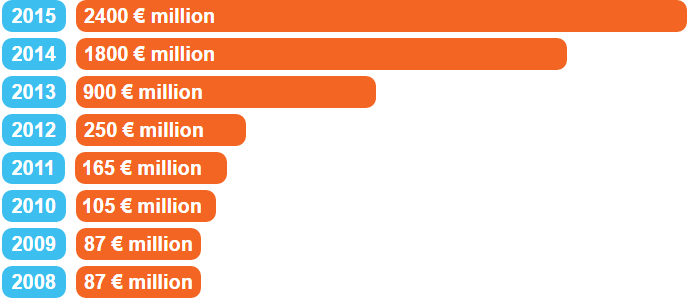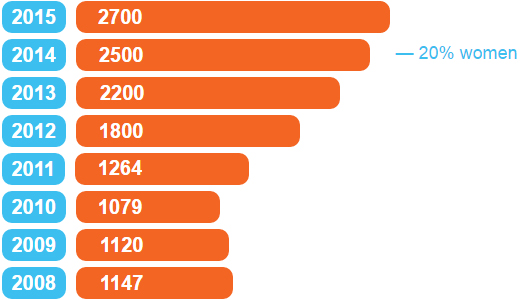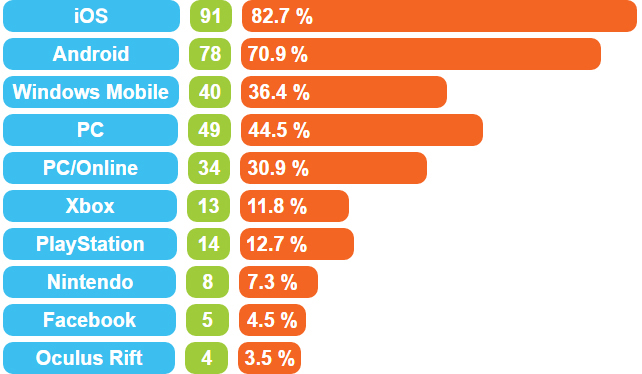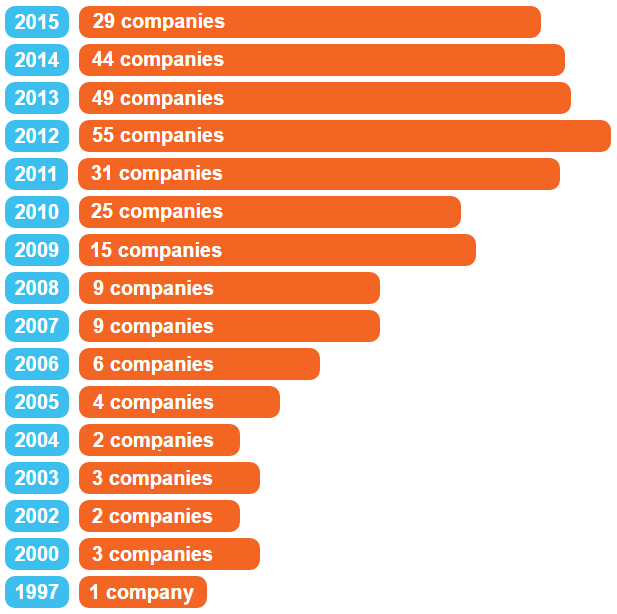What does the Finnish gaming industry look like? What are the conditions for investing in games in Finland? Is it possible for foreigners to launch a company in Finland and get support? We talked about this and much more with Oleg Paliy, who is organizing Finnish Game Day together with Nevosoft on June 27 in St. Petersburg.

Photo: www.helfi.ru
First, a few words about Finnish Game Day. This is a small event within the framework of the White Nights Conference. It will be held the day before the opening of the “White Nights” at the Consulate General of Finland. Within its framework, Finnish developers will tell their Russian colleagues about their experience. You can learn more and register here.
Hi! Let’s start from afar. How old is the Finnish gaming industry?

Oleg Paliy
Hello. The first Finnish game was released in 1986. If we take it as a starting point, the Finnish industry turns 30 years old this year.
What is the turnover of the Finnish gaming industry today?
In 2014, the turnover amounted to €1.8billion, and in the past it was €2.4 billion.

Chronology of the total turnover of gaming companies in Finland
And what does the Finnish gaming industry look like in general today?
A difficult question. If we are talking about the number of developers, there were 2,700 in Finland last year. Slightly less than a quarter are women. The number of companies has come close to the mark of 290 companies.

Number of people employed in the Finnish gaming industry
Most of them develop games for mobile platforms.
Listen, how did it happen that today Finland is one of the main mobile gaming forges in the world?
This is a popular question. And he has a simple answer. There was Nokia. She pulled the whole industry with her.
But, you know, I want to point out one fundamental point. In 2003-2004 Nokia tried to enter the market of portable consoles with N-Gage. It was both a phone and a game console with cartridges at once. And many Finnish gaming companies then focused on it.
The console did not go, but the focus of Finnish companies remained. Competencies, respectively, also remained. And when the java platform began to gain popularity at the same time, developers simply took up the creation of java games instead of developing games for N-Gage. It pulled everything else with it. Plus, do not forget about Nokia, which, even in the noughties, lost a lot due to the bursting of the dot-com bubble, but continued to actively contribute to the development of IT in the region.

The popularity of gaming platforms among Finnish game developers
I also came across the opinion that Finland has a very cohesive gaming community. Is it so?
Yes, I believe that this is a fundamental factor in the success of the industry. The founder of the Finnish gaming community is KooPee Hiltunen from Neogames, who, by the way, will speak at our event.
A very strong IGDA party. There is also a Game Jam. The latter is a non-profit organization whose goal is to promote game development as a hobby. Now it has 700 people.
They have regular events where people create games without a mercantile interest, without the goal of making money. This is exactly the popularization of game development as a hobby.
Is it necessary? Does the support of such a hobby give rise to a huge amount of trash?
The popularization of game themes leads to the fact that people are either added to the industry or stop making games.
Plus, it will be a community in any case, the question is, in what form exactly?
The support of such a community by large companies (including as sponsors and organizers of events), the fact that Rovio and Supercell employees are its members… All this testifies to the high level of the enlightenment itself. So the answer to your question, I think, is clear.
For example, Supercell holds Games First once a year. These events in Helsinki are exclusively for Finnish game developers. Neither consultants, advertising networks, nor anyone else are allowed on it. They bring platforms to these events, invite developers to listen to them, plus they talk only about games.
This is what enlightenment turns out to be.
It turns out to be such a mercantile event. A springboard for finding employees.
I agree. The same events are sponsored by successful Finnish companies. But I am sure that they are not limited to this only.
When people meet, share experiences, discuss what works well and what works poorly – this allows one to learn from others, from successful colleagues. This drags the whole industry. In Finland, companies that generate more than a million euros a year in terms of sales are only 10% of the total.
That’s a lot.
In Finland, as I have already noted, about 290 companies are now registered. And there are 20 companies that generate more than a million euros a year. Or even less. This is completely normal for the gaming industry.
How does the interaction between public funds and developers usually take place?
In Finland, the most serious state investor in gaming companies is Tekes.
Tekes invests about 600 million euros a year in R&D, in new developments, in support of companies. Tekes once invested in Rovio, in Supercell, in Remedy, in Seriously. In general, absolutely all well-known Finnish companies received support from Tekes.
Under what conditions does it work?
Tekes is a state fund, it does not pursue the task of making money on companies as such. They give money to companies as grants for some innovative R&D projects. This may well be the development of a new monetization model, the development of a new approach to user engagement, the development of various platforms that can be used in a number of games in the future. Etc. Tekes do not give money just for the development of the game, they need some innovative interesting component that will allow them to say that yes, this is a risky interesting R& D project, and we are ready to invest in this development.
Tekes always works on a project basis. The company submits an application, it is considered from a week to 2 weeks. They have their own internal processes, but now the decision-making time has accelerated very much. Tekes has a program that aims to develop a gaming cluster. Over the entire existence of game studios in Finland, more than 100 companies have received money from them.
And how can these benefits be obtained by companies that are only formally Finnish? For example, the development is being carried out in St. Petersburg, and in order to receive investments, they move or organize an office in Finland. Is it possible to receive investments from the Finnish government under such a scheme?
Tekes look at a project that is really intensive in terms of R&D, and give from 50% to 70% of the money needed for the project as a grant. Or they also give money as long-term loans at a conditional 1%. Or even less. It can be a loan, a convertible loan. Lots of options. You can talk to them, they are quite flexible. They have been doing this for a long time, and they have a well-developed approach in terms of lawyers and so on.
As for the companies that are formally Finnish. It should be understood that this is not the case that Tekes is looking for. They give money – Supercell and Rovio at one time received quite large investments from them – with the idea that someday these companies will return the money as taxes. These taxes are paid either by the company or by the company’s employees.
Another prerequisite for working with Tekes is that the IP of the product being developed belongs to a Finnish company. That is, in this case, if the IP of the product being developed is located in a Finnish company…
Formally Finnish or really Finnish?
Formally, there can be no Finnish company. There is a company that is registered in Finland and which owns the IP of the product or service being developed, whatever. In this case, the R&D Center can be located in St. Petersburg, or in Moscow, or in Krasnoyarsk. We had a case when the guys with the R&D Center in Kiev received a grant from Tekes. Each situation is considered separately. But if it is a Finnish company that does not have a single employee in Finland, if it is a paper company, then this is not their case. They will take it badly.
Can you tell us about those real cases where the development was carried out not in Finland, but the studio received grants?
This is a company in which the IP, plus the product manager and the operations manager, are located in Finland. And that, by the way, makes sense. Because there are very intelligent people in Finland from the point of view of product management. The format in which product management is located in Finland, and development, for example, in Russia – there are such cases.
Can you name specific cases?
I just don’t know how much companies with specific cases want it to be publicly written about. But there are cases. There are successful companies whose founders are Russian citizens and foreign citizens, and who have received grants from Tekes. There are such cases.
But if initially there is a company that just wants to relocate? Was Russian, wants to become Finnish. How difficult will it be to do this?
It is quite simple to do this. Company registration takes a couple of days. You can register a company in Finland online, you do not have to come to the registration office. But there is one “but”. Finland has two official languages – Finnish and Swedish. Therefore, you can fill out the form online only in these two languages.
By the way, we are in the KAATO business community, working in cooperation with Invest in Finland/Finpro (this is a non-profit organization within which foreign companies are helped to develop business in Finland), and we are helping companies with this. This is my job with gaming companies – to give the company the right start in Finland.
For example, I have guys from St. Petersburg who are now relocating. They have a gaming office in St. Petersburg, in Ukraine and in the Czech Republic. And now the management is moving to Helsinki. And R&D remains.
So if a company wants to move and start, it’s done quite simply. In Finland, it is quite easy to find specialists who can help.
Arja Martikainen, who is the founder of Games Jobs Finland, will speak at the Finnish Game Day event. She has helped and is helping with recruiting to all well-known gaming companies.
There will also be Cyril Barrow, VP Operations from Rovio. He opened a Gameloft office in Finland. And so Arya helped him with this in terms of recruiting.
The gaming industry in Finland is already established, so there is a certain pool of recruiters whose focus is the gaming industry. Therefore, it is quite easy to find a suitable specialist here. Again, due to the fact that gaming events are regularly held, and every month an IGDA meeting is held in Finland, at which any company can sponsor and tell about itself that it is launching an office in Finland and is looking for a specialist.
At the events that take place, companies can find partners, because you need to understand that in order to register a company in Finland, you need to have one of the board members of a person with a European residence permit. This is a normal practice throughout Europe. Without this, it will not be possible to open a company in any EU country.
We just talked about the positive aspects. But surely there are also disadvantages that you need to remember when you are going to open or relocate a company from another region in Finland? What are these pitfalls, what are the disadvantages.
Come on, but first I’ll tell you a little more about the pros.
Finland is a country where it is possible to keep accounting exclusively in electronic form. You don’t need a lot of papers, everything is done quite simply and quite transparently. Accordingly, the tax authorities have all the capabilities and interfaces to ensure that all document flow and communication with the tax service take place in electronic form. This is also, I think, quite a big plus in comparison with the administration of the company in Russia. And in all of Eastern Europe, where bureaucracy is slowly disappearing, but it takes time. It should be understood that if you have a company in Finland, but at the same time you are selling a product and have a development somewhere else, the administrative issue is greatly reduced.
And the cons?
Finland is quite expensive in terms of competent resources compared to Russia. Development in Finland is expensive, and this may be one of such pitfalls. Finland is a country with such a way of life that people come to work early and leave it early. The day starts at 8 and lasts until 4-4.30.
Finns are people who are pleasant to work with, you can trust them, but they are also specific people. They will not stay in the office for long evenings, they prefer to work strictly allotted hours.
Once they started talking about the disadvantages. When we talk about Finnish developers, everyone hears such names as Supercell, Rovio and Remedy. But how large is the number of those who fail, how do they then give money to the state?
There are companies that have raised investments and failed to justify them. There are such cases. I think there are quite a lot of such cases.
How do they give it away?
Finland is a country with specific and clear rules. There will certainly be an audit of the company. It is always held if the company cannot pay off its debts. And if the audit does not find malicious intent in the bankruptcy of the company, then the companies are limited liability companies for that.
There are few forms of organization of companies in Finland – you can count on the fingers of one hand. Of the 290 gaming companies in Finland, 260 or 270 are companies or limited liability companies. In Finland, this is called “joint stock companies”. There are 100% shares that belong to several or one person. The company’s liability is limited to the authorized capital. This is the only thing that shareholders risk – equity. Somewhere around 15-20 gaming companies are private entrepreneurs. These are people who independently develop games, self-publish and independently make a profit. And about 10-15 companies are gaming cooperatives. Cooperatives are more student projects, they do not set themselves the task of 100% profit and have some kind of IP. They appear due to the fact that there are 25 educational institutions in Finland where gaming is taught. But most of the companies are limited liability companies.
Now there is such a trend in Finland… Last year 20-30 companies that were created – they were created by the so-called “second-round startups”. This means that the founders of the company are organizing a second gaming company, not the first.
The first one fell apart?
There could be many reasons. But the first company does not exist. In English it sounds like second round startups. An analysis of this trend was carried out, and everyone decided that this only speaks of a certain maturation of the gaming industry. It is clear that when people open not the first gaming company, they understand much more about it than those who open the first company. This is a new trend that has emerged recently. And second-round startups are now the majority in the gaming industry. And there are fewer companies that are opening in the gaming industry. Noticeably less. In 2015, only 29 new companies were opened. For comparison, 44 companies were organized in 2014.

Dynamics of the emergence of new companies in Finland
We can say that the industry is maturing.
I see. Thanks for the interview!
You will be able to learn about the latest trends in the gaming industry first-hand, personally meet and discuss working issues with leading companies in the game development and publishing market at White Nights St. Petersburg 2016, which will be held on June 28-29.
